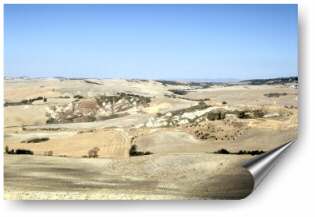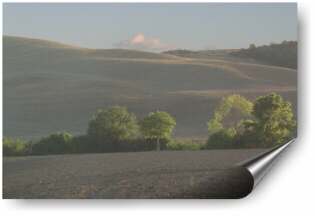Today
Val d'Orcia is peripheral, a land fresh and unspoilt where the
character of its agricultural economy and the persistence of
the inhabitants to work the earth and the natural materials
found in the area, have safeguarded the relationship between
man and the environment.  This valley is not only a place full of poetry and naturally
happy people. It is a valley which contributed to handing down
history and human relationship which has determined the quality
of an area which was traversed by the roads of ancient Rome
- The Francigena. All the events which developed along this
highway and the adjacent hills, created a landscape which fascinated
the great Sienese painters of the Renaissance, the European
travellers of the "grand tour", the romantic writers of England,
Germany and France, and which still charm us to this day. The
scenery of the Val d'Orcia, which begins with a symmetry of
natural harmony with its soft rolling hills, changes into the
majestic grandeur of the Amiata, a mountain abounding with springs
of crystal clear water and luxuriant vegetation.
This valley is not only a place full of poetry and naturally
happy people. It is a valley which contributed to handing down
history and human relationship which has determined the quality
of an area which was traversed by the roads of ancient Rome
- The Francigena. All the events which developed along this
highway and the adjacent hills, created a landscape which fascinated
the great Sienese painters of the Renaissance, the European
travellers of the "grand tour", the romantic writers of England,
Germany and France, and which still charm us to this day. The
scenery of the Val d'Orcia, which begins with a symmetry of
natural harmony with its soft rolling hills, changes into the
majestic grandeur of the Amiata, a mountain abounding with springs
of crystal clear water and luxuriant vegetation.  The
colours of dry clay and golden earth, share the hills; dark
green moss and undergrowth cover the base of rocky crags and
old farm houses; the gentle colours found in the orderly lines
of vineyards mix with the silver grey of the olive groves. The
solitude, the empty spaces, the light, the views, conjure up
a sense of pleasure, delight and even loneliness difficult to
define. The Val d'Orcia is a landscape of never-ending hills,
interspersed with torrents, ravines, rugged outcrops, river
banks which intertwine until they are lost in the ash colour
of the distant Crete.
The
colours of dry clay and golden earth, share the hills; dark
green moss and undergrowth cover the base of rocky crags and
old farm houses; the gentle colours found in the orderly lines
of vineyards mix with the silver grey of the olive groves. The
solitude, the empty spaces, the light, the views, conjure up
a sense of pleasure, delight and even loneliness difficult to
define. The Val d'Orcia is a landscape of never-ending hills,
interspersed with torrents, ravines, rugged outcrops, river
banks which intertwine until they are lost in the ash colour
of the distant Crete. The Francigena, winding among this natural but hostile beauty
throughout the centuries, has contributed towards the growth
of the small centres and the pride of an ancient people, accustomed
to sharing the dreams, arrogance and the Utopia pf powerful
and famous men. The farming community of the Val d'Orcia has
never surrendered to progress, it has always welcomed travellers
and pilgrims and always made them welcome.
The Francigena, winding among this natural but hostile beauty
throughout the centuries, has contributed towards the growth
of the small centres and the pride of an ancient people, accustomed
to sharing the dreams, arrogance and the Utopia pf powerful
and famous men. The farming community of the Val d'Orcia has
never surrendered to progress, it has always welcomed travellers
and pilgrims and always made them welcome.

